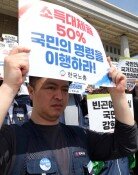[Editorial] Rohs Last Year
Uri Party Chairman Kim Geun-tae said two days ago, The democratic reform forces have been helpless in dealing with peoples livelihoods, calling that the time under the rule of presidents Kim Dae-jung and Roh Moo-hyun a lost decade. He also stressed the need of a practical policy line which values peoples livelihoods. He said the right thing. The problem is that the remaining year and a half of the incumbent administrations term is more worrisome.
The New Deal for economic revitalization, which was proposed by Kim and Kang Bong-kyun, Chairman of Uri Party Policy Committee, is confusing as well. President Roh has often done a reckless adventure of governing the market with shock and control, rather than boosting corporations will to do business and adopting a policy based on market principles. The president bragged, saying, Dont worry about the economy during my term, but investment, consumption and jobs went away abroad. Although he argued, Politics for people in the lower income brackets, emphasizing reform, distribution and balance, his arbitrariness, which ignored even the basic principles of the economy, only gave a hard time to people.
Kang identified the equity investment limit on large companies, the management of fair trade policy centering on regulating conglomerates and the regulations against the Seoul Metropolitan area as the top three obstacles to investment, vowing to withdraw the restrictions on total amount of share holding of other companies this year. That is part of the New Deal policy. Such a change of position by the ruling party is desirable. However, Cheong Wa Dae attempted to thwart the effort, raising the issue of identity. It seems that the administration failed to free itself from the concept of left-leaning identity, even after confirming the fact for three and a half years that it cannot revitalize peoples livelihoods by repeating empty political catchphrases without enhancing competitiveness and growth potential.
Although it should make a breakthrough with determined actions, the ruling party does not take a concrete measure, just saying, Well never give up the New Deal. This makes one wonder what happened to the Kim who boasted, saying, Ill confront the president without considering our hierarchal differences.
Regarding the Private School Law, the ruling party appears to be a stumbling block to Cheong Wa Daes action. The ruling party objected twice to the presidential offices request to revise the law, citing, That goes against Uri Partys identity. The stubbornness that it would not revise the law filled with unconstitutional poisonous clauses is evidence of its double standard with which it claims practicality but would not abandon its code.
With regards to diplomatic and security issues, such as taking back wartime control command, Cheong Wa Dae and the ruling party do not give up leftist adventurism in which they gamble with peoples safety. When military veterans pointed out, Taking back wartime command is a populist measure and abandonment of war deterrent insurance, Kim even expressed his anger. Against this backdrop, the criticism that he turns left with the right signal light turned on is not groundless.
The Sea Story incident reveals the overall picture of the ruling camps lack of the ability to manage a country and integrity, greed and corruption. There have been various alarms about problems of the gambling which enshrouded the whole country with the madness of gambling since a year ago. Representatives from the opposition parties urged the National Assembly to inspect gambling rooms June last year, and Seoul Young Korean Academy also requested the Board of Audit and Inspection to do an audit in June this year. The Korea Independent Commission against Corruption reported to Cheong Wa Dae that there is a serious cozy relationship between the Korea Media Rating Board and gambling chains in May. The National Intelligence Service also submitted a report to Cheong Wa Dae last month which indicated that criminal organizations control the distribution network of gift certificates and that the amount of tax evasion by game arcades reaches 8.8 trillion won yearly.
The administration, which turned a blind eye to or even incited that, is far from a level headed administration. Worse yet, President Roh says with composure, I have nothing to be ashamed of in front of the public, apart from policy mistakes, although there is much talk of involvement of powerful figures in the incident. This strikes us as the culmination of incapability and irresponsibility. Under these circumstances, people must find it frustrating that they have to live with the incumbent administration for another year and a half.
Kim shares some responsibility for the lost decade. He should show a clear attitude and philosophy if he wants to drive economic recovery. If he tries to find an exit, citing that the government does not listen to him, that would be another fraud against the public.
The Grand National Party (GNP), for its part, should break with opportunism and demonstrate its leadership in driving policy for recovery of the economy and peoples livelihoods. GNP Chairman Kang Jae-seop said about the New Deal, The ruling party and Cheong Wa Dae should reach an agreement first, but that is an attitude of a bystander. One must wonder if he cannot take the initiative by proposing grand policy reconciliation to the ruling party. The public will judge who conducts politics for peoples livelihoods. Now, people need the leadership of the ruling and opposition parties which will compete each other to win the forthcoming presidential election more than the Cheong Wa Dae of President Roh Moo-hyun.







